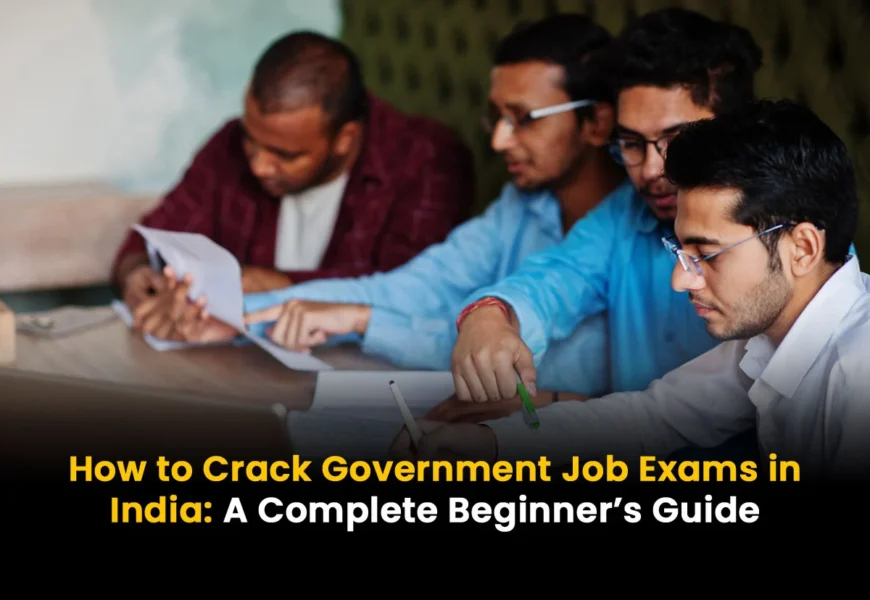You are not alone in dreaming of a secure, respected and well-paying government job in India. Every year, lakhs of candidates prepare for government exams like SSC, UPSC, Banking, Railways, Defence and State-level services, but only a few are successful in them and get a government job.
This blog is a complete step-by-step guide for freshers, students, or working professionals who want to start preparing for a government job in a smart way, even if they are starting from absolutely zero.
Step 1: Understand the Types of Government Jobs Available
Before you start preparing, you should know what type of government job suits you:
Central Government Jobs:
- UPSC (IAS/IPS/IFS) – India’s toughest and most prestigious exam
- SSC CGL/CHSL – For clerical, assistant, and officer-level roles
- Banking (IBPS, SBI, RBI) – Probationary Officers, Clerks
- Railways (RRB NTPC/Group D) – Technical and non-technical staff
- Defence (NDA, CDS, AFCAT) – Indian Army, Navy, Air Force
- PSUs (BHEL, ONGC, NTPC) – Through the GATE exam
State Government Jobs:
- State PSCs (e.g., MPSC, UPPSC, BPSC)
- Teaching jobs (TET/CTET)
- Police, Patwari, Forest Guard, and Clerk jobs in respective states
Tip: Choose your target exam(s) based on your background, interest, and age eligibility.
Step 2: Know the Syllabus and Exam Pattern
Each exam has a different pattern. But most include:
- General Awareness (Current Affairs, History, Polity)
- Reasoning Ability
- Quantitative Aptitude
- English / Regional Language
- Optional papers (e.g., for UPSC or State PCS)
Visit the official exam website and download the detailed syllabus and previous year papers.
Step 3: Gather the Right Study Material
Don’t overload yourself with 20 books. Start with 2–3 high-quality sources per subject.
Recommended Books:
- General Studies: Lucent GK, NCERT (6–12)
- Quantitative Aptitude: RS Aggarwal, Fast Track Arithmetic
- English: Wren & Martin, SP Bakshi (Arihant)
- Reasoning: MK Pandey or R.S. Aggarwal
- Current Affairs: Vision IAS Monthly, PIB, News Apps
For online learners, platforms like Unacademy, Testbook, Adda247, and StudyIQ offer affordable test series and video lectures.
Step 4: Create a Smart Study Plan
Make a realistic and consistent schedule.
- 4–6 hours daily (if you’re a student or fresher)
- 2–3 hours daily (if you’re working full-time)
- Break your time into subject slots
- Include daily MCQs + one mock test per week
- Revise weekly
Use planners, Google Sheets, or mobile apps like Notion or Trello to track progress.
Step 5: Practice Mock Tests & PYQs
Mock tests are the real game-changer.
- Attempt sectional tests and full mocks regularly.
- Analyse your mistakes in detail.
- Solve previous year papers (5–10 years)
- Track your speed and accuracy.
Mock tests help you improve time management and boost confidence.
Step 6: Stay Consistent & Stay Updated
Consistency matters more than motivation.
- Read Daily Current Affairs (especially 6 months before the exam)
- Watch 10–15 minute daily news videos or follow a reliable blog
- Join Telegram groups or forums for doubt-solving
- Practice answer writing if you’re preparing for UPSC/State PCS
Bonus Tips to Increase Your Chances:
- Apply for multiple exams to maximise opportunity
- Manage stress with meditation, breaks, and hobby time
- Build a peer group or study buddy for accountability
- Subscribe to Sarkari Job alerts and official portals for notifications
- Always keep your resume, photo, signature, and documents ready
Conclusion
Preparing for a government job is like a marathon, not a sprint. Even if you are a complete beginner, if you have clarity, planning and practice, you can definitely succeed. Don’t wait for the “perfect time”, start today, take small steps, and stay focused.
Your dream job in the public sector is just one right strategy away.













